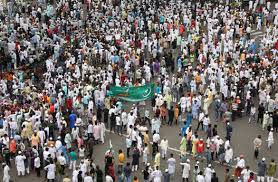In a ruling that has sparked conversations around the delicate balance between urban development and heritage preservation, the Gujarat High Court has given the green light for the partial demolition of the historic Mansa Masjid, a 400-year-old mosque located in the Saraspur area of Ahmedabad. The decision was handed down on Tuesday, September 23, 2025, as part of an ongoing effort by the Ahmedabad Municipal Corporation (AMC) to ease traffic congestion in the city.
The court’s ruling, delivered by Justice Mauna M. Bhatt, rejected a legal plea filed by the Mansa Masjid Trust, which sought to stop the demolition and secure a four-week stay of execution on the grounds of religious and cultural significance. The trust had argued that the mosque, dating back four centuries, is not only a religious site but also a symbol of Ahmedabad’s Islamic heritage. However, the court maintained that the larger public interest — specifically in relation to the expansion of road infrastructure between Kalupur Railway Station and the Ahmedabad Metro Junction — must take precedence.
The case pits the authority granted under the Gujarat Provincial Municipal Corporations Act against provisions of the Waqf Act, with the court siding with the municipal body’s powers to carry out the demolition as part of its urban planning mandate. The Mansa Masjid Trust further claimed that earlier objections submitted in January 2025 had been overlooked by city authorities, but the court found no merit in this argument.
State officials defending the move stated that the road-widening project was critical to alleviating persistent traffic bottlenecks in one of Ahmedabad’s busiest transport corridors. They also stressed that due process had been followed at every stage, and that the mosque was only partially affected by the development, not entirely razed as some feared.
This legal decision draws parallels to a similar case from September 2024, in which the Supreme Court of India declined to halt the demolition of a 500-year-old mosque in the Gir Somnath district, again citing the broader public interest. That ruling had already set a precedent regarding how heritage religious structures may be treated in the context of modern infrastructure projects.
With India’s rapid urbanisation, local governments are increasingly faced with tough decisions around accommodating expanding populations while preserving historical and religious landmarks. The Gujarat High Court’s recent verdict appears to tilt that scale in favour of development — a move that is both applauded by city planners and contested by cultural preservationists.
As the Ahmedabad Municipal Corporation proceeds with the implementation of the road expansion project, the situation continues to draw mixed reactions from residents, legal observers, and religious organisations alike.







